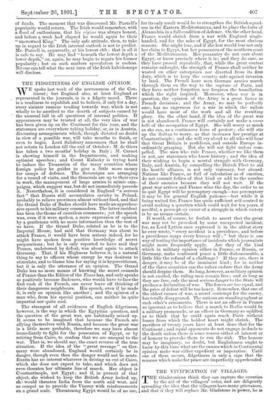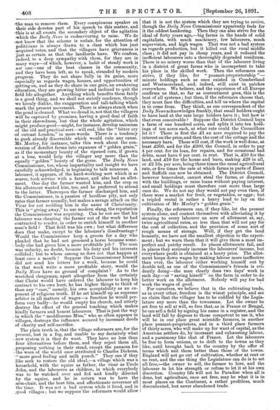THE VIVIFICATION OF VILLAGES.
THE Gladstoniansthink they can capture the counties 1 by the aid of the villagers' votes, and are diligently spreading the idea that the villagers have many grievances, and that if they will replace Mr. Gladstone in power,,he is 4he man to remove them. Every conspicuous speaker on their side devotes part of his speech to this matter, and 'this is at all events the secondary object of the agitation which the Daily News is endeavouring to raise. We do .not know that the scheme is unfair, for the attention of politicians is always drawn to a class which has just acquired votes, and that the villagers have grievances is just as certain as that the landlords have. We confess, indeed, to a deep sympathy with them, for they are in many ways—of which, however, a habit of steady work is not one—one of the best classes in the community, _and they have been left, so to speak, stranded by modern ,progress. They do not share fully in its gains, more -especially as regards wages, houses, and opportunities of .,getting on, and as they do share in one gain, an awakening ,education, they are growing bitter and inclined to quit the field life altogether. Anything which benefits them fairly is a good thing, and we shall not strictly condemn, though we keenly dislike, the exaggeration and tall-talking which mark the present movement. There is always stench when the pond is cleaned. What we dread is, not that the villagers will be captured by promises, having a good deal of faith in their shrewdness, but that the whole agitation, which -might produce good—might, for instance, develop unionism .of the old and practical sort—will end, like the " bitter cry of outcast London," in mere words. There is a tendency to gush already discernible which would ruin any cause. .Mr. Morley, for instance, talks this week about the con-. version of derelict farms into expanses of " golden grain," as if the momentary beauty of. the ripened corn, if grown at a loss, would help the villager any more than the equally " golden " beauty of the gorse. The Daily News -Commissioner, too, whose impartiality and insight we have . carefully acknowledged, is beginning to talk nonsense. A labourer, it appears, of the hard-working sort which is so scarce, took service with a farmer, and also had an allot- ment. One day the farmer wanted him, and the crop on this allotment wanted him, too, and he preferred to attend to the latter. Thereupon the farmer discharged him, and the Commissioner, in a passion of heedless pity, not only rates that farmer soundly, but makes a savage attack on the Vicar for not scolding him in the name of Christianity. This is " giving away," to use modern slang, the reputation the Commissioner was acquiring. Can he not see that his -labourer was cheating the farmer out of the work he had contracted to render, in order to enrich himself in another man's field ? That field was his own ; but what difference does that make, except to the labourer's disadvantage ? Would the Commissioner keep a groom for a day who pleaded that he had not groomed a horse because some- -body else had given him a more profitable job ? The man was unlucky, no doubt, because his duty and his interests collided ; but to whom among us does not that happen at :least once a month ? Suppose the Commissioner himself • .clid not send his letters for a week, because he could _in that week write a more profitable story, would the .Daily News have no ground of complaint ? As to the wretched clergyman, apart altogether from the certainty that Christ would have ordered the labourer to keep his contract to his own hurt, he has higher things to think of than any " case," namely, his own acceptability as an ex- ponent of religious truth. If he set himself up as supreme arbiter in all matters of wages—a function he would per- Iorm very badly—he would empty his church, and utterly destroy the effect of the general teaching which makes kindly farmers and honest labourers. That is just the way in which the " meddlesome Miss," who so often appears in -.villages, destroys the influence secured by incessant deeds of charity and self-sacrifice.
The plain truth is, that the village reformers are, for the • present, lost in a fog, and unable to say decisively what ..new system it is they do want. They have no less than four alternatives before them, and they reject them all, , proposing nothing in their stead, except the panacea for ,the woes of the world once attributed to Charles Dickens, more good feeling and milk punch." They can if they -like seek to restore the old ideal,—a village which was a household, with the squire as father, the vicar as Uncle John, and the labourers as children, in which everybody was to be watched over and fed and kindly directed by the squire, and he in return was to have the arm-chair, and the best bits, and affectionate reverence all the time. It was not a bad system while it lived, and in good villages ; but we suppose the reformers would allow that it is not the system which they are trying to revive, though the Daily News Commissioner apparently feels for it the oddest hankering. Then they can also strive for the ideal of forty years ago,—big farms in the hands of solid capitalists, with much machinery, few labourers, much supervision, and high wages. That was not a bad system as regards production, but it killed out the rural middle class ; it did not pay in cheap years, and it reduced the inefficient labourers into a thoroughly degraded residuum. There is no misery worse than that of the labourer living in a district of great farms who is incompetent to take his place in the skilled work. Then the reformers can strive, if they like, for " peasant-proprietorship "- minute holdings such as once existed in Cumberland and Westmoreland, and, indeed, still exist in patches everywhere. We believe, and the experience of all Europe confirms us that, so far as contentment goes, this is the best of all systems ; but then, if the reformers choose that, they must face the difficulties, and tell us where the capital is to come from. They think, as one correspondent of the Daily News acknowledges frankly, that small holders ought to have land at the rate large holders have it ; but how is • that even conceivable I- Suppose the District Council buys a farm of one hundred acres, and splits it into ten hold- ings of ten acres each, at what rate could the Councillors let it ? There is first the £1 an acre required to pay the interest on the price, and then the cost of the cottage and the necessary barn. These will cost, if the work is well done, at least £300, and for the £300, the Council, in order to pay 4 per cent. for its loan, for repairs, and for occasional bad debts, must have 6 per cent. in rent. That is, £10 for the land, and £18 for the house and barn, making £28 in all, or £2 16s. per acre, being three times the usual agricultural rate, or five times the rate at which farms in parts of Essex and Suffolk can now be obtained. The District Council, however benevolent., cannot steal the farms, or dispense with the buildings, or raise loans without paying interest, and small holdings must therefore cost more than large ones do. We do not say they would not pay even then, if there were a market for fruit, or vegetables, or eggs ; but a tripled rental is rather a heavy load to lay on the cultivation of Mr. Morley's " golden grain."
Finally, the reformers can, if they like, let the present system alone, and content themselves with alleviating it by securing to every labourer an acre of allotment at, say, twice agricultural rates, as less than that will not pay for the cost of collection, and the provision of some sort of rough means of storage. Well, if they get the land honestly, we have not the smallest objection to the experi- ment ; but we warn them that it will give them a most im- perfect and patchy result. In places allotments fail, and in places they seriously increase the labourers' income, but everywhere profit is obtained at a heavy price. The allot- ment keeps down wages by making labour more ineffective than ever, the labourer either working himself out by double toil, as one of the Commissioner's friends is evi- dently doing—the man clearly does two days' work in each day—or " saving hisself " on the farm in order to do better work on the allotment. Nobody will pay for bad work the wages of good.
For ourselves, we believe that in the cultivating trade, as in every other, freedom is the wisest principle, and see no claim that the villager has to be coddled by the Legis- lature any more than the townsman. Let the owner be set free to sell at will, so free that, as in France or Bengal, he can sell a field by signing his name in a register, and the land will fall by degrees to those competent to use it, who will be in one place great scientific farmers, in another place peasant-proprietors, and in a third place farmers of thirty acres, who will make up for want of capital, as the American settlers do, by incessant and exhausting labour, and a parsimony like that of France. Let the labourers be free to form unions, or to drift to the towns as they like, until brought back to the country by the offer of terms which suit them better than those of the towns. England will not go out of cultivation, whether at rent or no rent, and the one thing the Legislature can do is to set all free,—the owner to sell, the farmer to hire, and the labourer to let his strength or refuse to let it at his own discretion. Country life will not be Paradise when all is done, but agriculture, once set free, may be what it is in most places on the Continent, a rather profitless, much discontented, but never abandoned trade.



































 Previous page
Previous page